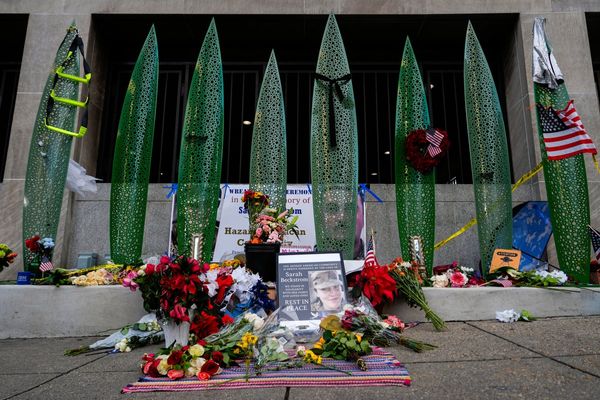
Israeli forces have stormed towns and begun demolishing homes of Palestinian suspects in the wake of a deadly attack in occupied East Jerusalem, raising fears of further military and settler violence and collective punishment in the occupied West Bank as Israel relentlessly pounds the Gaza Strip.
Israel said on Tuesday that it surveyed and ordered the demolition of the homes of two Palestinians suspected of the shooting on Monday at Ramot Junction in occupied East Jerusalem, which killed six people and wounded 12.
Hamas’ armed wing, the Qassam Brigades, claimed responsibility for the shooting, in which both suspects were killed.
In a statement, Defence Minister Israel Katz said he also ordered sanctions to be imposed on the men’s family members as well as residents of their towns, Qatanna and Qubeiba, northwest of Jerusalem in the West Bank.
Those sanctions included the demolition of every structure built without permits in the towns and the revocation of 750 work permits and entry permits to Israel.
Israeli government ministers, including Katz and far-right National Security Minister Itamar Ben-Gvir, issued hardline statements in the wake of Monday’s attack, promising to demolish homes and deport the suspects’ family members.
While Israel says such actions are intended as a deterrent to future attacks, Palestinians and human rights groups say they amount to a form of collective punishment, which is prohibited under international law.
Neighbours’ homes face demolition
Speaking to Al Jazeera from the occupied West Bank, journalist Leila Warah said that most Palestinians in the affected areas built their homes “without Israeli permission which is almost impossible for them to get.”
“They’re forced to build… on their own land, illegally,” she said. “The Israeli military now as punishment is saying that they’re going to come in and demolish a lot of these homes.”
Warah said about a dozen towns and villages near where the suspected gunmen came from had been put “under siege”, affecting about 70,000 people. She said the high military presence made it difficult for people to leave their homes.
Reporting from Amman, because Al Jazeera is banned in Israel and the occupied West Bank, correspondent Hamdah Salhut said Israeli forces had barricaded off roads surrounding the homes of the suspected gunmen.
“There has been a complete siege and lockdown of these areas,” she said. “Collective punishment is in full swing in the occupied West Bank.”
Three homes demolished
During the crackdown in the West Bank on Tuesday, Israeli forces destroyed three other Palestinian homes of slain Hamas operatives and a detainee accused of an earlier attack as punishment.
Soldiers encircled the house of detainee Thabet Masalma, accused of having carried out a shooting in December, in the town of Beit Awwa, southwest of Hebron, before blowing up the property with explosives.
The raid sparked clashes with locals, during which Israeli soldiers fired live ammunition, wounding two people. Masalma is accused of taking part in an attack that killed an Israeli settler and wounded three people.
The demolition left the detainee’s wife, parents and three children homeless.
In the town of Aqaba, north of Tubas in the occupied West Bank, Israeli forces also demolished the homes of two prominent local leaders of the Qassam Brigades, the armed wing of Hamas, who had been killed in Israeli operations.
Sources told Al Jazeera that Israeli forces had stormed Aqaba and demolished the home of Abdel Raouf Al-Masri who had been killed when Israeli forces surrounded his home and shot him in October last year.
They then demolished the home of Ahmed Abu Arra, who had been killed in an Israeli strike targeting his vehicle in Jenin in August 2024.
Israel accused him participating in forming armed cells, developing and manufacturing explosive devices, and carrying out attacks against Israeli targets.

Tensions high
While raids and settler attacks against Palestinians in the West Bank have ramped up since the war in Gaza began in October 2023, Monday’s attack has heightened tensions and sparked fears of increased violence and repression.
On Tuesday, the Palestinian news agency Wafa, quoting local sources, reported that Israeli forces stormed the town of Biddu near Qubeiba and closed its main entrance, which connects it to the town of al-Jib and is the only main road for tens of thousands of people.
During the raid, Israeli forces fired live ammunition, sound bombs and, during clashes with locals, tear gas.
Israeli forces also raided several other towns northwest of Jerusalem and carried out arrests using tear gas.
Israeli army chief Eyal Zamir said in a statement that he had ordered a “full closure” of the area that the alleged gunmen in Monday’s shooting had come from.
“We will continue with a determined and ongoing operational and intelligence effort, we will pursue terror cells everywhere, and we will thwart terrorist infrastructure and its organisers,” he said.
Local sources told Al Jazeera Arabic that a number of settlers had attacked homes belonging to Palestinians and spray-painted racist slogans in the village of Jurish, south of Nablus.
Wafa reported that Israeli settlers also vandalised vehicles belonging to Palestinians in Jurish, a town southeast of Nablus, breaking their windows, while another group of settlers cut down olive trees grown by Palestinian families in neighbouring Aqraba.
In Hebron governorate, Israeli forces arrested two people and set up several military checkpoints at the entrances to towns, villages and camps. Soldiers also closed several primary and secondary roads, Wafa reported.







